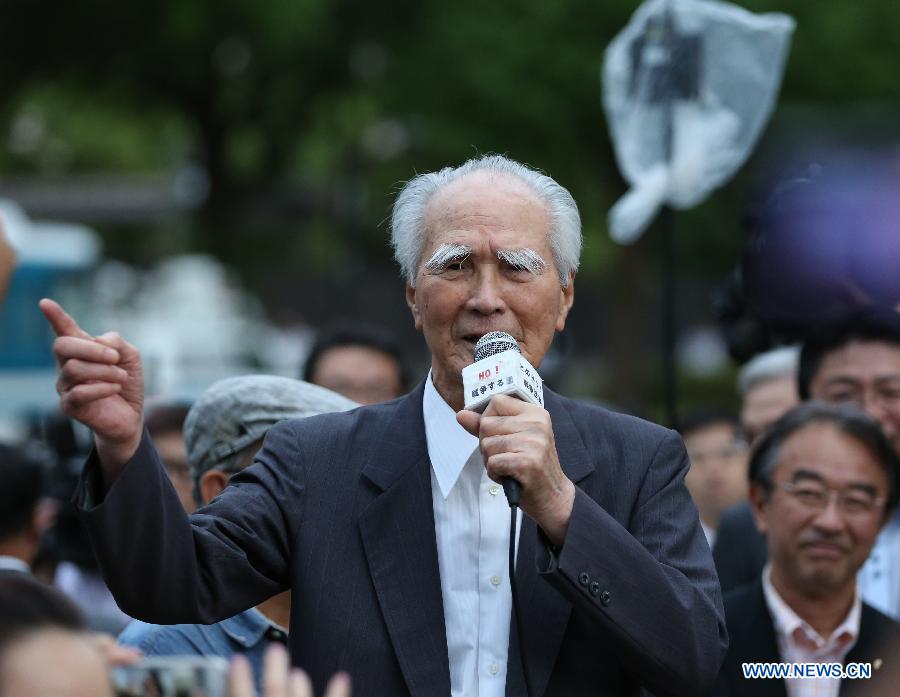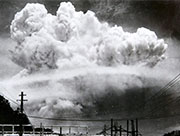

 |
| Former Japanese prime minister Tomiichi Murayama (C) delivers a speech outside the National Diet in Tokyo on July 23, 2015, to protest against a series of controversial security bills aiming to reinforce Japanese army's capacity and overturn the nation's "purely defensive" defense posture significantly. While he spoke, hundreds of Japanese protestors rally there against the security bills. (Xinhua/Liu Tian) |
As the representative of the Japanese government, Japanese Prime Minister should get a clear understanding and admit what Japan has done in the past. It’s necessary for Japan to apologize for its crimes on Asian people including Chinese and to pledge not to follow their old ways. This is the right way for Japan to gain the trust of its neighbors.
20 years ago, I delivered the “Murayama statement” that made conclusions on Japan’s historical issues. Since then, all Japanese Prime Minsters have stated that they inherit the “Murayama statement,” including Shinzo Abe on his first tenure. But when he took office in his second tenure, he stated that he would not inherit the statement completely. His perception on historical issues sparks worldwide concern.
Abe's planned statement to mark the 70th anniversary of the end of World War II will be meaningless if there are no keywords like "aggression and colonial rule," "apology" and "deep remorse". He needs to inherit the “Murayama statement”,
Japan enacted a pacifist constitution which bans the country from using force outside the country and has been seeking peaceful diplomacy after World War II. Just because of this, Japanese people live a happy life. However, Abe is attempting to enable Japan to exercise constitution-banned rights to collective self-defense via amending the post-war pacifist constitution.
Abe’s administration is also trying to push the security-related bills in the Diet. What Abe has done is strongly opposed by Japanese people. The wrong moves of Abe’s administration are criticized by an increasing number of Japanese people, including young Japanese, who used to show little concern about politics. Even young Japanese mothers bring their children to take part in activities to object to security-related bills.
Latest polls here showed that the majority of Japanese people opposed the security bills. The disapproval rating of Abe’s cabinet exceeded his supporting rate. It’s necessary for Abe to respect the wishes of Japanese people. I will set myself against Abe’s abuse of power, and I will do whatever I can to prevent the passage of security bills.
China loves peace and will never seek hegemony. Thanks to a peaceful environment after World War II, the country has risen to become the world’s second largest economy. So it treasures peace more than any other country, and it will never wage wars. China will hold a parade on September 3, 2015, to mark the 70th anniversary of the victory of the War of the Chinese People's Resistance Against Japanese Aggression. I will attend the activity as long as I am in good health.
Japan and China have similar languages and living environments. In some sense, Japanese culture developed in the exchanges between the two countries. The relations between two countries are inseparable. Japan’s trade is increasingly dependent on China, but Japan has its advantages in science and technology development. The two countries should learn from each other, and strengthen exchanges. I deeply believe that it’s an irrevocable trend for Japan to conduct friendly exchanges with China.
The author is 91-year-old Former Japanese Prime Minister Tomiichi Murayama.
This article was edited and translated from 《需要切实继承“村山谈话”(国际论坛》,source:People's Daily
Day|Week

 The striking moments of Chinese battleship firing
The striking moments of Chinese battleship firing Largest bullring for Dong people built to accommodate 50,000 people
Largest bullring for Dong people built to accommodate 50,000 people Chinese people go crazy about the swimming champion Ning Zetao
Chinese people go crazy about the swimming champion Ning Zetao Photos of a BFA sophomore go viral online
Photos of a BFA sophomore go viral online PLA type 96A tanks race in "Tank biathlon" in Moscow
PLA type 96A tanks race in "Tank biathlon" in Moscow Marking the 70th anniversary of Hiroshima atomic bombing
Marking the 70th anniversary of Hiroshima atomic bombing Final of 2015 Miss Weihai Tourism concludes
Final of 2015 Miss Weihai Tourism concludes Cosplay model at ChinaJoy: photo story
Cosplay model at ChinaJoy: photo story